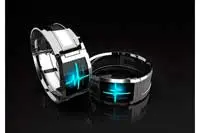 A prototype radio from the University of Massachusetts Amherst that allows small mobile devices, such as fitness trackers and smartwatches, to take advantage of battery power in larger devices nearby for communication is currently undergoing testing.
A prototype radio from the University of Massachusetts Amherst that allows small mobile devices, such as fitness trackers and smartwatches, to take advantage of battery power in larger devices nearby for communication is currently undergoing testing.
"We take for granted the ability to offload storage and computation from our relatively limited personal computers to the resource-rich cloud," professor Deepak Ganesan from the University of Massachusetts Amherst explains. "In the same vein, it makes sense that devices should also be able to offload how much power they consume for communication to devices that have more energy. For example, the battery on your smart watch could survive longer by using the higher battery level on your smartphone."
To achieve this, the team at Amherst have embellished Bluetooth, a commonly-used radio technology, with the ability to operate in a similar manner to radio-frequency identification (RFID), which operates asymmetrically – meaning the reader does most of the work and pays the majority of the energy cost of communication, while the tag, embedded in a smaller device or object, is extremely power-efficient.
The technology, named Braidio for ‘braid of radios’, operates like a standard Bluetooth radio when a device has sufficient energy, but operates like RFID when energy is low, offloading energy use to a device with a larger battery when needed. So, when a smartwatch and smartphone are equipped with Braidios, they can work together to proportionally share the energy consumed for communication.
Graduate student, Pan Hu, added that Braidio test results show that when a device with a small battery is transmitting to a device with large battery it can offer roughly 400 times longer battery life than Bluetooth, since the smaller device's battery is preserved longer.
Ganesan said that technologies like Braidio will help to open up a new way of thinking about the design of mobile and wearable devices. "Wearable devices are often bulky due to large batteries needed for adequate battery life," he says. "Perhaps such energy offload techniques can reverse this trend and enable thinner and lighter devices."
Author
Peggy Lee
Source: www.newelectronics.co.uk
